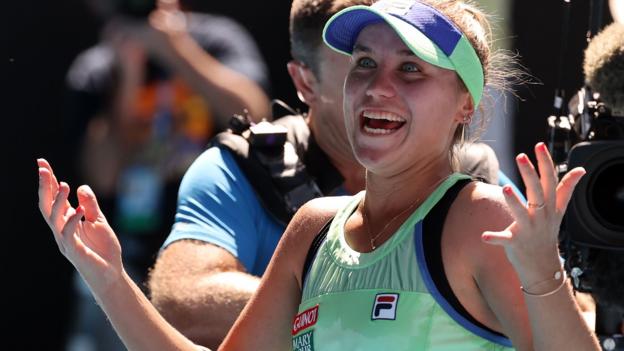
Sofia Kenin reached her first Grand Slam final by beating a nervous top seed Ashleigh Barty in straight sets in the Australian Open semi-finals.
The 21-year-old American, seeded 14th, won 7-6 (8-6) 7-5 in sweltering conditions at Melbourne Park.
Australian Barty, aiming to become the first home woman to reach the final in 40 years, failed to convert two set points in each set.
Kenin will face unseeded Spaniard Garbine Muguruza in Saturday's final.
The two-time Grand Slam champion saw off fourth seed Simona Halep 7-6 (10-8) 7-5.
Florida-raised Kenin, who was born in Russia before moving to the United States as a baby, dropped her racquet on the floor and cupped her face with both hands when Barty hit a return long on match point.
"I'm speechless. I can't believe it. I've dreamed of this since I was five years old. I've worked so hard to get here," she said.
Kenin is the first American to reach the Australian Open final, outside of the Williams sisters, since Lindsay Davenport in 2005.
She was a child prodigy in the States, having made numerous television appearances and played alongside the big names when she was young.
Now she has fulfilled that promise by reaching her first Grand Slam final.
Possessing a feisty nature and a tremendous will-to-win, she showed all of her qualities to overcome Barty and shock the expectant crowd on Rod Laver Arena.
Australia's wait continues
Barty insisted she was not being swept away by growing public excitement as she aimed to follow Wendy Turnbull in 1980 by reaching the Melbourne final, and ultimately become the nation's first champion here - either male or female - since Chris O'Neil in 1978.
Yet she looked edgy in the crucial moments throughout the match.
Barty's service game - where she won 20 of her 24 service points before coming under pressure for the first time at 5-5 - kept her out of serious trouble.
That was until the first-set tie-break when tightness crept in again, missing two set points, before Kenin cracked two winners in a row to swing momentum back in her favour.
With a set point on serve, the American took it when Barty swung at a second serve and lumped the ball into the net.
Barty started to play more freely in the second, breaking early for a 2-1 lead, and finally started to cause problems for Kenin with her backhand slice.
But she got tight again in the crucial moments, unable to take two more set points when serving for the second at 5-4.
Anguished cries from the passionate home support greeted a drive forehand volley into the net on the second.
From that point she struggled to recover.
Barty did save the first match point with a whipping cross-court forehand winner that ended a 17-shot rally but succumbed to the second as Kenin won in one hour and 45 minutes.
Barty, who won her maiden Grand Slam at the French Open in June, acknowledged playing in her first Australian Open semi-final was a "different experience".
However, the 23-year-old did not think she was adversely affected by the occasion.
"I put myself in a position to win the match and just didn't play the biggest points well enough to be able to win," said Barty, who appeared at her post-match news conference with 12-week-old niece Olivia on her lap.
"I have to give credit where credit's due. Sofia came out and played aggressively on those points and deserved to win."
Extreme heat arrives in Melbourne
Melbourne is known for its variable weather and, after poor air quality caused by the devastating bushfires, and torrential rain earlier in the tournament, it was the turn of scorching heat to potentially cause problems.
Temperatures touched 40C for the first time during the fortnight, meaning the Australian Open's extreme heat policy came into force.
Their scale reached 4.0 just before the players came on court, triggering an extended break between the second and third sets - if it had gone that far.
Both players are well accustomed to playing in sweaty conditions, Barty hailing from Queensland and Kenin growing up in Florida.
Neither looked adversely affected by the temperatures and humidity, although sensibly used ice towels at the changeovers.
The heat scale rocketed up to 4.9 during the match, just falling short of the 5.0 required to stop the match and close the court's roof.
Play was suspended on the outside courts in the wheelchair and junior competitions where the threshold for stopping play is lower.
Rows of empty seats in the sun-soaked parts of Laver started to appear as the match wore on, while fans outside opted to watch the big screen from shaded areas under trees rather than the available deckchairs.















 Phone: (800) 737. 6040
Phone: (800) 737. 6040 Fax: (800) 825 5558
Fax: (800) 825 5558 Website:
Website:  Email:
Email: 






